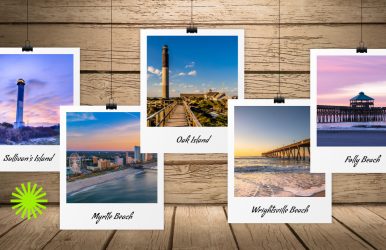The Closest Beach To Knoxville, TN: Know The Best Getaways
BY Sibashree Sep 20, 2023
Does Tennessee have a beach? No, it does not. For the longest time, I have been planning a long beach holiday. And something or else will always turn up ruining the plan. The kids have their exams and there are family commitments. So, our beach vacation was always limited to Douglas Lake or Cherokee Lake. However, I had done my research on the closest beach to me and this time, we had a long weekend. So our road led to Sullivan’s Island, the closest beach to Knoxville, TN. Having said that, there are many beaches near Knoxville TN. For example, Myrtle Beach in South Carolina is one of the most popular ocean beaches near Tennessee. We also have Folly Beach in South Carolina and Oak Island in North Carolina. In today’s Tour and Travel blog, we will talk about the beaches close to Knoxville TN, and tell you why they are most suitable for the ultimate Tennessee beach vacation. What Is The Closest Beach To Knoxville Tennessee? Our journey to the closest beaches to Knoxville TN will start from Sullivan’s Island, as promised. However, before taking you on a tour of these beaches, I wanted to share the best time to visit the closest beach from Knoxville TN. Knoxville primarily has two tourist seasons. You can visit the closest beach to Knoxville, TN between March and June and September to November. So, let’s begin the ultimate Knoxville beach journey. Here we go! 1. Sullivan’s Island, South Carolina Distance from Knoxville: 380.4 Miles Travel Time: 6 Hours I was looking for ocean beaches within 6 hours of me, and I found out Sullivan’s Island. It is a barrier island with an area of around 8.91 km². Further, Sullivan’s Island, the closest beach to TN, stands out with its local history. It has Fort Moultrie, built in 1776 and it still tells the story of how it protected the city from the cannonball attacks of the warships. Moreover, Sullivan’s Island is important in the history of literature. Edgar Allan Poe was stationed at Fort Moultrie between November 1827 to December 1828. 2. Myrtle Beach, South Carolina Distance from Knoxville: 412 Miles Travel Time: 6 Hours 46 Minutes Sitting in Knoxville, I was looking for beaches within 7 hours of me. I found the name of Myrtle Beach in South Carolina. Myrtle Beach is nothing short of a fantasy island and it was once the hub of pirates. Further, Myrtle Beach is associated with the Indigenous people and roaming ghosts. A visit to Myrtle Beach is incomplete without exploring the Ripley’s Aquarium of Myrtle Beach. Further, you must spend some time at the Myrtle Beach State Park, and Myrtle Beach Pinball Museum. 3. Folly Beach, South Carolina Distance from Knoxville: 383 Miles Travel Time: 6 Hours 35 Minutes Folly Beach, one of the closest beaches to Knoxville, is the ultimate destination to stay, eat, play. and explore! Further, life on Folly Beach revolves around outdoor activities. From a casual stroll on the beach to more adventurous activities like surfing, boating, kayaking, and biking, Folly Beach offers you the opportunity to enjoy the best beach vacation. Moreover, Folly Beach is a wonderful melting pot of modern entertainment and exploring wildlife. You can attend the Annual Folly Festivals and take part in birdwatching and exploring wildlife. Blu Restaurant And Bar, Bert's Market, and Bounty Bar are some popular places to eat on Folly Beach. 4. Kiawah Island, South Carolina Distance from Knoxville: 396.5 Miles Travel Time: 6 Hours 30 Minutes Kiawah Island with a majority of marshland, is located at a distance of 6 hours and 16 minutes by car from Knoxville. To emphasize the adventure, let me tell you that the beach is often used for native wildlife watching! Several locations across the beach are perfect if you are looking for wildlife spotting! The two locations popular for this purpose on the beach are Canvasback Duck Pond and Marsh Island Park. What’s more, there are two scenic observation towers in Kiawah where you will get a 360-degree view of the sea and land! If you are a hiker or like to bike, this beach is perfect! They have natural paths for these types of adventures. For accommodation, there is a private 2nd story deck that you can rent to enjoy some stunning ocean views. There is one popular restaurant called Jasmine Porch where you can splurge on good food, especially the Low-country favorites such as shrimp and grits, she-crab bisque, fresh seafood, po’boys, and burgers! 5. Isle Of Palms, South Carolina Distance from Knoxville: 383 Miles Travel Time: 6 Hours 30 Minutes There is a playground for children, so this is the perfect destination if you have kids. There is also a picnic area, so if you plan to spend the whole day out, you can go to this beach. For accommodation, there is a single-family cottage which is well decorated! Food is another important part of the vacation, so I suggest the Sea Biscuit Cafe! Try out the seafood omelets, shrimp, and gravy because these are the low-country options. 6. Hilton Head, South Carolina Distance from Knoxville: 411 Miles Travel Time: 6 Hours 32 Minutes You have to visit this beach for the best sunsets across the water! In a distance of 6 hours, 26 minutes from Knoxville, the coastal paradise is someplace to be visited. If you are planning on staying the night, there is a resort rental that you can book. You can enjoy the outdoor and indoor pool, a tiki bar, etc. You must catch the coastal area food, especially crab cakes, sandwiches, shrimp, grits, and salads. 7. Oak Island, North Carolina Distance from Knoxville: 441.5 Miles Travel Time: 7 Hours 14 Minutes If you are looking for a scenic beach, Oak Island is the place to visit for all adventurous activities. Water sports are quite famous here, along with that, you can see Fort Caswell, used in the 1800s and 1900s. This is one of the beaches near Knoxville TN! You will take 7 hours and 8 minutes to reach the beach and can visit the island lighthouse, which is situated just beside the fort. There is a perfect walk to enjoy Oak Island Nature Center at the beach, so if you are a nature lover, you know where to go! Further, adventures such as kayaking are the thing to do as an outdoor adventure sport. Many family homes and rentals are at a distance of the March beach, providing incredible views across the beach. If you visit the beach, you must try out scrumptious food items such as steak, chicken, and pasta, apart from the delicious seafood. 8. Wrightsville Beach, North Carolina Distance from Knoxville: 442 Miles The beach is a little farther from Knoxville, TN, as it takes about 7 hours and 23 minutes. There are three beaches in Wilmington: Kure, Carolina, and Wrightsville. All the beaches qualify as some of the best beaches near Knoxville. Apart from common activities such as shopping and dining, there are interesting activities to perform, such as going on catamaran cruises, visiting the History Museum, and attending fairs and seasonal festivals. The Fred and Alice Stanback Coastal Education Center organizes educational programs and treasure hunts for children. IIn terms of food, you will find some of the best cheeseburgers at this closest beach to Knoxville, TN! If you are a picky eater, you will find various options, from steaks to seafood platters. 9. Kure Beach, North Carolina, Closest Beach To Knoxville, TN Distance from Knoxville: 449.5 Miles Travel Time: 7 Hours 30 Minutes The beach at Kure is beautiful, apart from the North Carolina Aquarium, which is situated at Fort Fisher. Significant features are located at the beach, such as a nature play area, an adventure reef, and touch tanks. This beach is located at a distance of 7 hours and 31 minutes. Apart from the beach, you can also visit places such as the historical site of the Civil War Museum, the Fort Fisher State Site, beach cruises, a dog park, and a playground in front of the beach. You cannot miss the food such as burgers, sandwiches, seafood and pasta! I am already drooling! 10. Tybee Island, Georgia: Closest Beach To Knoxville, TN Distance from Knoxville: 434 Miles Travel Time: 7 Hours The beach is located at a distance of 6 hours and 55 minutes by road from Knoxville. Some of the place’s main attractions are the restaurants and the quaint little shops. The beach is popular for people finding their relaxing haunt near Tennessee. Considering, it is the closest beach to Tennessee! It is a low-key beach situated just outside of Savanah! Apart from relaxing on the beach, you can also access different amenities in Savanah, such as museums, historic architecture, upscale shops, ghost tours, and other attractions perfect for family outings. Beautiful rentals are close to the beach and a 1-minute distance from where you can enjoy some stunning visuals. The food available in and around the place is quite popular! One such restaurant is located near the waterfront called Bubba Gumbo. The seafood Gumbo is their signature dish! You can also order fried fish, jambalaya, burgers, and crab cakes. They also popularly serve shrimp. 11. Simon’s Island, Georgia: Closest Beach To Knoxville, TN Distance from Knoxville: 491.2 Miles Travel Time: 7 Hours 32 Minutes The beach is situated at a distance of 7 hours and 42 minutes from Knoxville, TN! The beach Oasis is a perfect place to relax, especially with all the amenities present to make your life easier. The Neptune Park Fun Zone here is for family attractions. You can also find a store to rent accessories for water sports restaurants, and several shops provide you with good food and the necessary equipment for the beach vacation, such as sunscreen, sunglasses, and others. There is one family beach rental along with its private swimming pool. The rental can host a family, which is pretty close to the lighthouse. You cannot miss the delicious food available on this closest beach to Knoxville, TN! Once such a restaurant opens, Porch offers fried catfish, shrimp, and fried chicken. Read Also: Top 8 List Of National Parks In North Carolina – Travel Guide Closest Beach To Nashville – Top 10 Beaches You Can Visit Top 10 Beaches In Gloucester In Massachusetts – Travel Guide The Perfect Getaway: Discovering The Closest Beach To Disney World!















